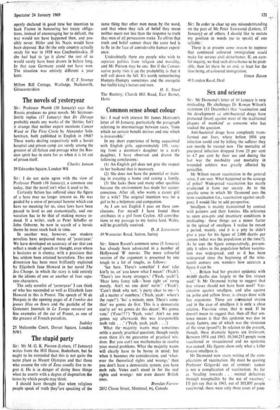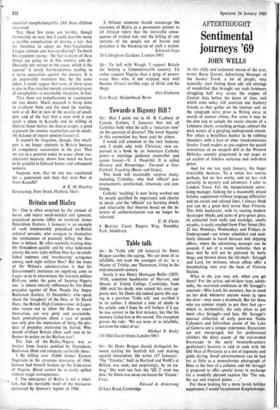Sex and science
Sir: Mr Desmond's letter of 10 January is very misleading. He challenges Dr Rowan Wilson's statement (13 December) that 'vaccination and the development ur anti-bacterial drugs have protected [man) against most of the traditional plagues of mankind' as someone who has studied the question.
Anti-bacterial drugs have completely trans- formed our lives; where before 1936 any infection could end by killing the sufferer they can mostly be treated now. The mortality of puerperal infection dropped from 23 per cent to 4.7 per cent by their use and during the last war the morbidity and mortality in wounded soldiers was greatly affected by penicillin.
Mr Wilson meant vaccination in the general sense, I am sure. What happened to the scourge of polio? Widespread vaccination has nearly eradicated it from our society. As to the specific sense in which Mr Desmond uses the term vaccination (i.e., vaccination against small- pox), I would like to add perspective.
Smallpox is mainly transmitted by contact with patients and their fomites. His reference to open cess-pits and insanitary conditions is misleading: these things are a minor factor in the spread of smallpox. I realise he meant a period, mainly, and it is a pity he didn't give a year for his figure of 2,000 deaths per annum (what was the population at the time?). As he uses the figure comparatively, presum- ably it refers to the population before vaccina- tion was widespread, and as it has been widespread since the beginning of the nine- teenth century one wonders how accurate a figure it can be.
. . Britain had her greatest epidemic with 46,000 deaths due largely to the live viruses used.' Is Mr Desmond trying to suggest that live viruses should not have been used? Vac- cination against smallpox, and also against TB, polio and yellow fever, is always done with live organisms. These are attenuated strains and in the case of smallpox it is only a close relative, Vaccinia virus, that is used. If he doesn't mean to suggest that, then all that sen- tence means is that this epidemic was due to many factors, one of which was the virulence of the virus (proof?). In relation to the present, though, these dramatic figures are irrelevant. Between 1954 and 1963, 10,344,215 people were vaccinated or revaccinated and no epidemic was caused. His figures show only what a killer disease smallpox is.
Mr Desmond now starts writing of the com- plications of vaccination. He must be quoting Professor Grigorski out of context: cancer is not a complication of vaccination. As far as 'heading towards . . . mental defectives through encephalitis by the use of vaccines,' I'll just say that in 1963, out of 303,895 people vaccinated, there were only three cases of post- vaccinial encephalomyelitis. (All three children recovered.
Yes, these few cases are terrible, though
fortunately so rare; but I could describe many a terrible complication of driving a car. Are we therefore to adopt an Anti-Vaccination League attitude and ban car-driving? To finish his argument saying : `the fact is many of these things are going on in this country and de- liberately not related to the cause, which is the vaccine' is surely hot-headedness leading to a nasty accusation against the doctors. It is an unprovable statement but, by the same token, I could suggest that none of these cases is due to Vaccinia but merely coincidental cases of encephalitis—a reasonable viewpoint, in fact.
That there are complications to vaccination no one denies. Much research is being done to eradicate them and the need for vaccina- tion at all. But in view of the severity of small- pox, and of the fact that a man with it can catch a plane in Karachi and be milling in Oxford Street before the disease erupts, a good argument for routine vaccination can be made; the balance of expert opinion favours it.
It mustn't be forgotten, though, that small-
pox is no longer endemic in Britain because of compulsory vaccination in the past. That we are in a position today to argue about vac- cination's necessity shows how much we have to be grateful to Edward Jenner and subsequent workers.
Suppose, now, that no one was vaccinated for a generation and then that man flew in from. Karachi?
A. K. M. Hutchin
Greenaway, Fore Street, Hatfield, Herts



































 Previous page
Previous page